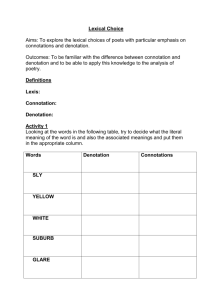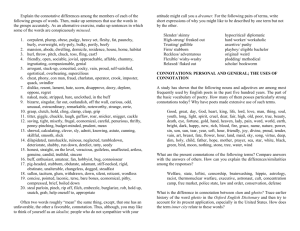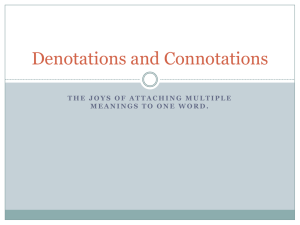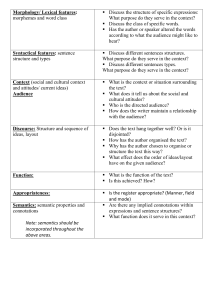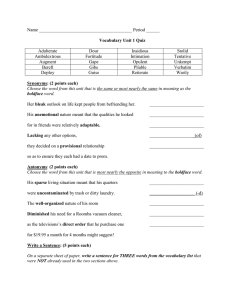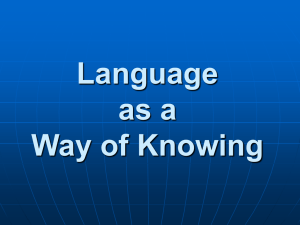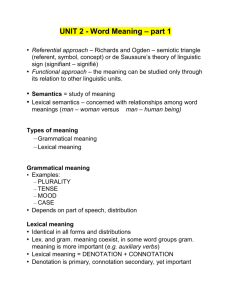Word Choice Questions with Extra Practice
advertisement
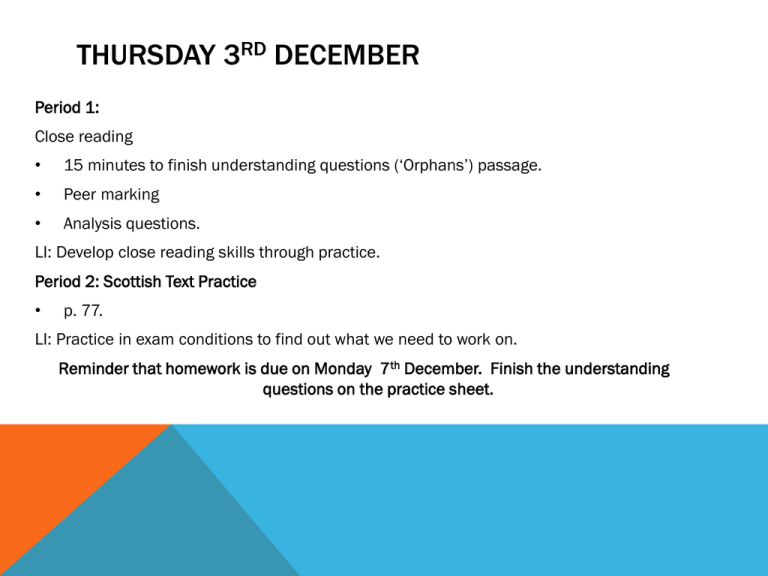
THURSDAY 3RD DECEMBER Period 1: Close reading • 15 minutes to finish understanding questions (‘Orphans’) passage. • Peer marking • Analysis questions. LI: Develop close reading skills through practice. Period 2: Scottish Text Practice • p. 77. LI: Practice in exam conditions to find out what we need to work on. Reminder that homework is due on Monday 7 th December. Finish the understanding questions on the practice sheet. UNDERSTANDING QUESTIONS PRACTICE Read the short ‘Orphans’ passage and answer the questions. This should take about 25 minutes. • As you read, highlight what you think are the main points or ideas of the passage. • Read the question fully. • Pay attention to the points. • Notice the words in bold. If you finish early, there is always revising to do! (of poetry or ‘The Lighthouse’) 1. Swap your passage with the person next to you. 2. Mark their answers using the answering scheme by highlighting where they have got a correct answer. ‘ORPHANS’ ANSWERING SCHEME. 1. Any 3 for 1 mark each: They did originally have a family. They were thrown out. They ran away. Their families could not support them. 4. A link between these paragraphs is established because the line ‘Such children were simply unnoticed’ from the first sentence of paragraph 2 links to the idea of children as ‘invisible’ at the end of paragraph 1. The second paragraph then continues the discussion of these unnoticed children. 5. 2 advantages for 1 point each: Advantages – stealing was easy. 2. A detailed summary of ‘In the prevailing conditions of extreme poverty….’: Disadvantages – children were often homeless; when they could At times when families were very poor, children were only given find work they were often exploited. close attention in the very early stages of their lives. 6. ‘Status of rats’ sums up the main ideas of the passage because: 3. 2 differences explained for 1 point each: Children then often had to run away in the same way that rats Children had to be much more independent than they have to do. be now. They had to find shelter, food and live unseen in the same way They were treated like adults. that rats do. They did not have the development and resources that adults They were also, in some ways, unloved, as are rats. had. ANALYSIS QUESTIONS ANALYSIS QUESTIONS: GENERAL TIPS • You will be questioned on the writer’s use of language and techniques for the most part in analysis questions. • You must quote and comment for these, using appropriate critical terminology when required. • You will be given marks for relevant quotations and/or correctly identifying a technique at N5 level. • For a 2 mark question, aim to quote and identify the technique and then comment. ANALYSIS QUESTIONS: WORD CHOICE • You are looking at how the writer uses specific words for specific effect • You will have to think about the connotations the words have, as well as their literal meaning • You MUST quote the words to which you wish to refer. This is often one of the marks • Your explanations must be clear – think through exactly what you want to say about the meaning and the effect WORD CHOICE QUESTIONS • Often groups of words with the same denotation (synonyms) can have very different connotations. • For instance, ‘slender’ and ‘skinny’ both mean ‘thin’, yet one has positive connotations and the other has negative. • A thin friend might be described as slender; a thin enemy would be described as skinny. In turn, this word choice would help the reader understand how the writer feels about each person being describes. WORD CHOICE TACTICS: THE FORMULA 1. 2. 3. Quote the word Think about its denotation (literal meaning) Explain its connotations (additional layers of meaning) and what these add to the passage E.g. The bride wore a white dress. Denotation = a shade with no colour Connotations = innocence, purity, virginity, holiness, creating a sense of sweetness and beauty. COPY DOWN THE DEFINITIONS TO ADD TO YOUR GLOSSARY/NOTES ON CLOSE READING Denotation The meaning of a word or image Connotation What is implied by the word or image Denotation –bird Connotation - peace Denotation – vital organ Connotation – love/romance FOR PRACTICE 1 The writer, a ten year old boy, has been allowed out riding alone for the first time. He dismounted to let the horse eat some grass and it had run away. I could have burst into tears at that moment but I managed to control my feelings. Half an hour afterwards I slunk into the stale yard with a sinking heart. No one seemed to be about. Quote the word which suggests the writer is so embarrassed he does not wish to be seen. (1 mark) Answer: ‘slunk’ THINKING ABOUT CONNOTATIONS How do the connotations of the following words differ? Try to write a sentence explaining the differences between the connotations of the words selected for each of the three groups listed below. 1. Walk saunter hike 2. Naughty disobedient evil 3. Eccentric weird unique FOR PRACTICE 2: COPY OUT THE STATEMENTS AND UNDERLINE THE MOST POWERFUL WORD IN EACH SENTENCE. 1. The boy was interrogated about his actions by his parents. Interrogated means to question someone aggressively. This has connotations of an aggressive, relentless questioning, perhaps trying to catch him out for some wrongdoing. 2. We have been bombarded with numerous images. Bombarded means… This has connotations of… 3. A return to the dark ages could be imminent. Imminent means… This has connotations of… FOR PRACTICE 3 The missing part of the Cinderella story is what happens when she puts on the glass slipper and disappears into the palace. Rowling filled in the blanks, describing to Jeremy Paxman how she has to cope with begging letters, journalists rifling through her bins, photographers lurking on the beach, and strangers accosting her in the supermarket. Explain how the writer’s word choice in these lines helps to show the negative effects of fame. (4 marks) Quote Comment Quote Comment ANSWER “begging” is constant and relentless requests for something. This has connotations of demanding, pleading requests which would be hard to ignore. “rifling” is to sort through something quickly and without much care. This has connotations of rummaging, ransacking her things, desperate to find something to expose which could be newsworthy. “lurking” means to follow or watch in a odd way from a distance. This has connotations of spying, skulking and watching someone without permission in an underhand and sinister way .
